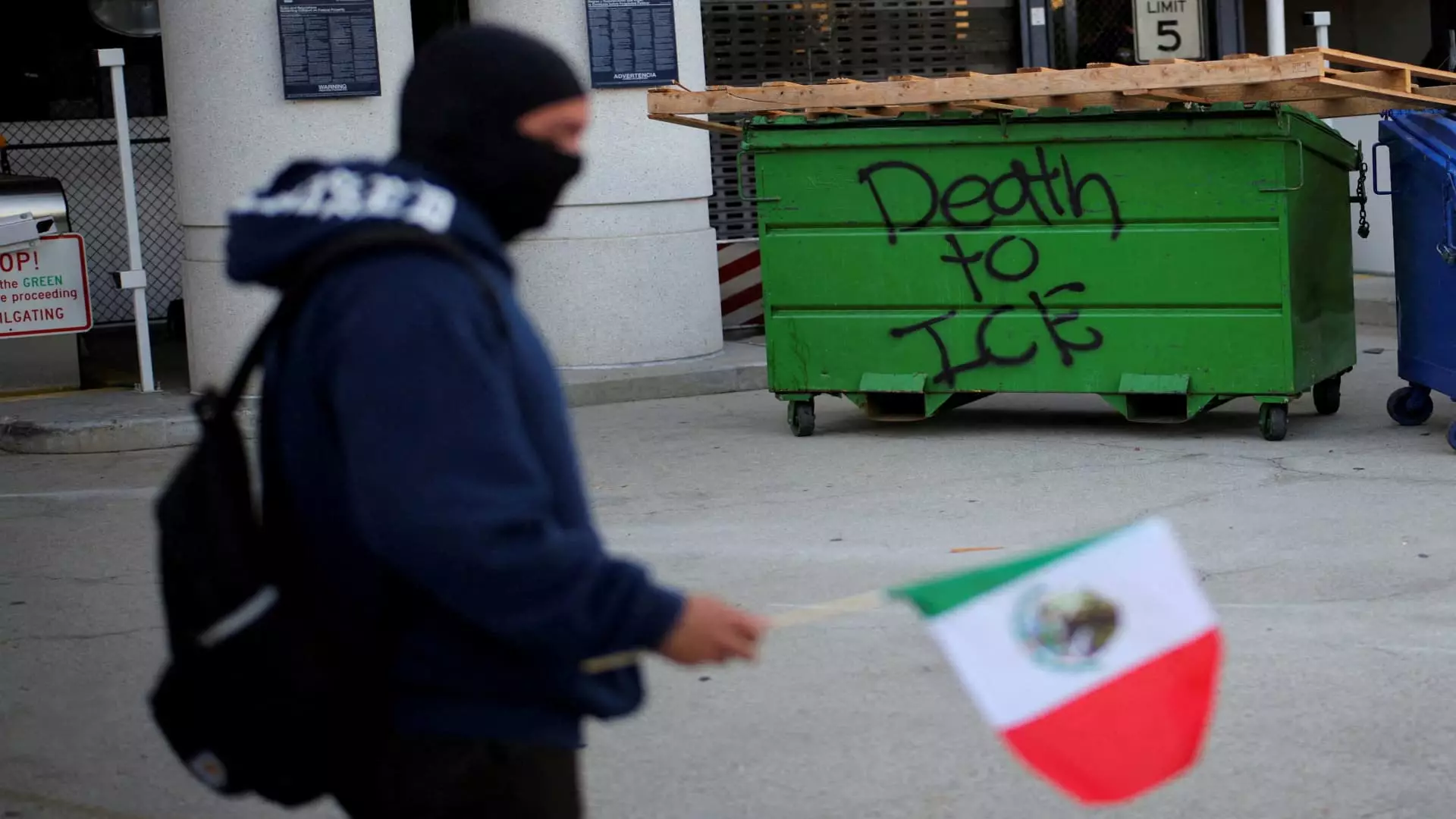The recent immigration protests in Los Angeles have unveiled a fierce struggle between federal immigration authorities and communities deeply affected by draconian enforcement tactics. This clash is not merely a confrontation over law and order but a manifestation of a society grappling with the moral implications of its laws and policies. On one side, federal agents—armed and helmeted—symbolize the weight of governmental power and the enforcement of policies that many deem hostile to human dignity. On the other, we find a diverse group of protesters who have become the voice of a collective anguish rooted in fear and despair, cognizant of the lives that hang in the balance.
As demonstrators gathered this past Saturday, much of the media’s lens captured not just the tumult of the moment but the broader implications of their actions. Protesters waved Mexican flags and donned masks, emblematic of both their cultural pride and the atmospheric tension choking their communities. The images of street confrontations featuring armed agents on one side and peaceful demonstrators on the other starkly underscore a growing polarization: one that pits a resolute community against an increasingly militarized and aggressive immigration enforcement strategy.
The Insurrection Label: Misuse of Language
The rhetoric surrounding these protests grew alarmingly intense, particularly following Stephen Miller’s labeling of the protests as an “insurrection” against the United States. This characterization not only dismisses the legitimate grievances of thousands of individuals but also serves to reinforce a narrative that frames dissent as a threat to national integrity. Such misuse of language dilutes the sanctity of real insurrections throughout history, downplaying the brave souls who have fought for justice and equality. To label these protesters insurrectionists is to trivialize their struggles and disregards the rights to peaceful protest that we, as a nation, hold dear.
Miller’s conclusions and the subsequent statements from the Department of Homeland Security echo a disproportionate response to the significant socio-political discourse surrounding immigration. When authorities characterize public dissent as insurrection, they effectively foreclose dialogue and reduce the power of advocacy, forcing communities to yield before hegemonic interpretations of law and order. This approach mirrors an authoritarian strategy that prioritizes the enforcement of laws over the humanity of those affected by these policies.
The Irony of Enforcement
It is ironic that the White House, under Trump’s administration, continues to promote a hardline immigration approach while fostering an atmosphere where basic human rights are overlooked. The promise to arrest thousands of migrants daily speaks volumes about the administration’s priorities. It frames immigrants as criminals rather than potential contributors to American society, perpetuating a harmful narrative that ultimately dehumanizes individuals merely seeking better lives.
The backlash against these immigration sweeps is rooted in a fundamental understanding—many communities in Los Angeles are composed of families with deep roots in their neighborhoods. Legal residents and citizens alike are affected, as the panic instilled by these raids rattles the very fabric of community life. Rather than strengthening the nation, this sharp focus on enforcement erodes the trust citizens have in their government and law enforcement.
The Response from Local Leadership
In stark contrast to the prevailing federal narrative, local leadership, such as Los Angeles Mayor Karen Bass, stands at the forefront, condemning the brutal tactics being deployed. By labeling these raids as acts that “sow terror in our communities,” Bass brings to light the ethical implications of an immigration policy that fails to distinguish between the lawful and the unlawful. Her words resonate with those who are most vulnerable, emphasizing that a society’s strength is measured not by its capacity to instill fear but by its ability to foster inclusivity and compassion.
Bass’s condemnation reveals a rift not just in policy but in the philosophy of governance. The mayor’s response highlights an empathetic approach focusing on humanity, contrasting sharply with the federal stance that emphasizes compliance through fear. As anger continues to rise among local communities, officials must confront not only the practical implications of enforcing unjust laws but also the moral repercussions of standing complicit in policies that disregard human rights.
Through this chaotic yet profound cultural moment, it is clear that the struggle for immigrant rights is far from a mere political disagreement. It is a reflection of America’s ongoing identity crisis, laying bare the enduring battle between the ideals of liberty and justice for all and the harsh realities of governance that often perpetuate division and fear. In this landscape, voices of dissent remain integral to reimagining the moral future of our society.


Leave a Reply